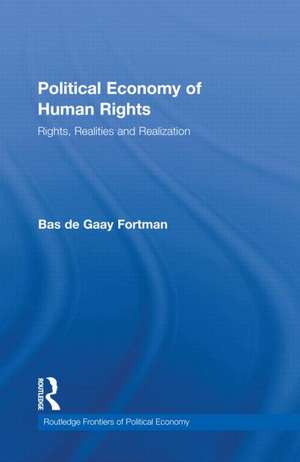Political Economy of Human Rights: Rights, Realities and Realization: Routledge Frontiers of Political Economy
Autor Bas de Gaay Fortmanen Limba Engleză Hardback – 13 mai 2011
After an introduction that familiarizes the reader with some of the key concepts used throughout, the book is divided into six chapters. The first two combine a critique of the overly legal use of human rights with a reconceptualisation of their potential as powerful tools outside of the legal context. The next two chapters examine the nature of the structural challenges that face realisation, both on the global and on the local level. The last two chapters analyse two major areas of the human rights deficit: the structural non-implementation of the rights of the poor and the failing protection of non-dominant collectivities. Finally, a concluding chapter elaborates on the main findings and insights gained.
The book combines rigorous juridical study with a focus on political-economic analysis of rights in context. Hence, it aims at an interdisciplinary treatment of human rights as opposed to current texts that have a tendency to be monodisciplinary. The book should be of interest to students of human rights, political economy, law and conflict studies, as well as those who work or research in these areas.
| Toate formatele și edițiile | Preț | Express |
|---|---|---|
| Paperback (1) | 483.86 lei 43-57 zile | |
| Taylor & Francis – iul 2012 | 483.86 lei 43-57 zile | |
| Hardback (1) | 1044.68 lei 43-57 zile | |
| Taylor & Francis – 13 mai 2011 | 1044.68 lei 43-57 zile |
Din seria Routledge Frontiers of Political Economy
- 9%
 Preț: 904.56 lei
Preț: 904.56 lei -
 Preț: 151.96 lei
Preț: 151.96 lei -
 Preț: 311.41 lei
Preț: 311.41 lei -
 Preț: 295.14 lei
Preț: 295.14 lei -
 Preț: 316.03 lei
Preț: 316.03 lei -
 Preț: 288.99 lei
Preț: 288.99 lei -
 Preț: 312.86 lei
Preț: 312.86 lei -
 Preț: 311.41 lei
Preț: 311.41 lei -
 Preț: 278.97 lei
Preț: 278.97 lei -
 Preț: 281.72 lei
Preț: 281.72 lei - 9%
 Preț: 934.25 lei
Preț: 934.25 lei -
 Preț: 309.90 lei
Preț: 309.90 lei -
 Preț: 310.36 lei
Preț: 310.36 lei -
 Preț: 325.09 lei
Preț: 325.09 lei -
 Preț: 310.95 lei
Preț: 310.95 lei - 9%
 Preț: 934.73 lei
Preț: 934.73 lei -
 Preț: 384.52 lei
Preț: 384.52 lei -
 Preț: 359.03 lei
Preț: 359.03 lei -
 Preț: 312.75 lei
Preț: 312.75 lei -
 Preț: 309.79 lei
Preț: 309.79 lei -
 Preț: 155.43 lei
Preț: 155.43 lei - 9%
 Preț: 934.94 lei
Preț: 934.94 lei - 9%
 Preț: 934.94 lei
Preț: 934.94 lei - 9%
 Preț: 936.90 lei
Preț: 936.90 lei -
 Preț: 356.63 lei
Preț: 356.63 lei -
 Preț: 152.66 lei
Preț: 152.66 lei -
 Preț: 311.41 lei
Preț: 311.41 lei - 9%
 Preț: 934.94 lei
Preț: 934.94 lei -
 Preț: 310.95 lei
Preț: 310.95 lei -
 Preț: 371.95 lei
Preț: 371.95 lei -
 Preț: 286.98 lei
Preț: 286.98 lei - 9%
 Preț: 935.17 lei
Preț: 935.17 lei -
 Preț: 310.01 lei
Preț: 310.01 lei -
 Preț: 310.55 lei
Preț: 310.55 lei - 9%
 Preț: 936.74 lei
Preț: 936.74 lei -
 Preț: 309.79 lei
Preț: 309.79 lei - 9%
 Preț: 938.47 lei
Preț: 938.47 lei -
 Preț: 329.09 lei
Preț: 329.09 lei -
 Preț: 341.32 lei
Preț: 341.32 lei - 26%
 Preț: 1047.06 lei
Preț: 1047.06 lei - 18%
 Preț: 1149.70 lei
Preț: 1149.70 lei - 18%
 Preț: 1528.87 lei
Preț: 1528.87 lei - 18%
 Preț: 1036.14 lei
Preț: 1036.14 lei - 18%
 Preț: 1041.94 lei
Preț: 1041.94 lei - 25%
 Preț: 767.47 lei
Preț: 767.47 lei - 18%
 Preț: 719.59 lei
Preț: 719.59 lei
Preț: 1044.68 lei
Preț vechi: 1274.00 lei
-18% Nou
Puncte Express: 1567
Preț estimativ în valută:
199.93€ • 208.28$ • 166.23£
199.93€ • 208.28$ • 166.23£
Carte tipărită la comandă
Livrare economică 10-24 februarie 25
Preluare comenzi: 021 569.72.76
Specificații
ISBN-13: 9780415581202
ISBN-10: 0415581206
Pagini: 280
Ilustrații: 3 tables and 13 line drawings
Dimensiuni: 156 x 234 x 18 mm
Greutate: 0.68 kg
Ediția:New.
Editura: Taylor & Francis
Colecția Routledge
Seria Routledge Frontiers of Political Economy
Locul publicării:Oxford, United Kingdom
ISBN-10: 0415581206
Pagini: 280
Ilustrații: 3 tables and 13 line drawings
Dimensiuni: 156 x 234 x 18 mm
Greutate: 0.68 kg
Ediția:New.
Editura: Taylor & Francis
Colecția Routledge
Seria Routledge Frontiers of Political Economy
Locul publicării:Oxford, United Kingdom
Public țintă
Postgraduate and UndergraduateCuprins
Introduction 1. Rights: The Dialectics of Power and Protection 2. Rights: The Dialectics of International Norms and National Practice 3. Global Realities: Conflict and Confrontation 4. Local Realities: Strife and Struggle 5. Realisation: The Rights of the Poor 6. Realisation: The Rights of Collectivities. Conclusion
Notă biografică
Bas de Gaay Fortman is the Emeritus Chair in Political Economy of the International Institute of Social Studies of Erasmus University Rotterdam, and Professor of Political Economy of Human Rights at the Utrecht University Law School, The Netherlands.
Descriere
The plethora of literature produced over the past decade in response to the perceived failure of the human rights project to deliver results for billions of people living in ‘adverse’ environments has usually focused on international legal standards and mechanisms, with little regard for the root structural realities that constrain their implementation. Hence, a text that primarily focuses on the major challenge of realisation of human rights in the context of diverse realities is urgently needed. This book, then, provides an analytical as well as inspirational text on human rights from a contextual perspective; it offers a reconceptualisation of human rights as not merely legal resources, but political tools as well.














